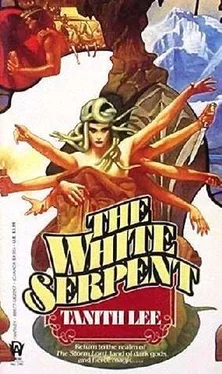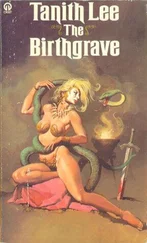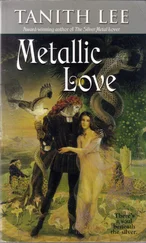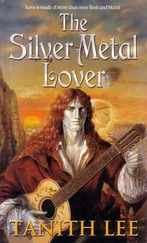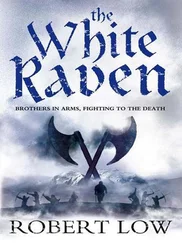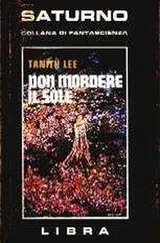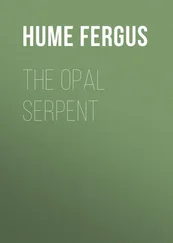“Yes,” said Rehger.
He had never spoken of his mother, and obviously would say no more of her now.
But that was as well, under the circumstances.
In five days they might be on the sea. Another month, and the real life he had been born for, there in that sty, would begin for Rehger Am Ly Dis.
When the rains paused, three priests of Cah came to call on Orhn and Tibo.
The priests seldom walked. In the snow they would have journeyed by dogsled; now the temple’s servants carried them in three litters, up the fearful track, over the valley, into the farmyard.
Tibo came to the door, kneeled down in the mud and bowed her head.
One by one the three priests were lowered to the ground and emerged, to stand there burning in their red and yellow, brass and beads.
“Get up, woman. Where are your men?”
Tibo got up. Head still bowed, she replied, “My husband Orhn is inside. Shall I fetch him?”
“Where is your husband’s brother?” said the priest who had spoken before.
“I don’t know, priest-master. Leave to speak?”
“I grant you.”
“Days ago, Orbin-master went to Ly, to offer to Cah. He didn’t return here. He took money, and maybe is delayed. He spoke of bartering or buying. Orhn lost cows this cold.”
“Did no one go to look for Orbin?”
“My husband—he never told me to go. Without his leave, I mustn’t. I did go a little way to look, but Orbin wasn’t there.”
“Enough,” said the priest. “I will tell you where Orbin is.”
He told her. Tibo listened, head bowed. When he ended, she lifted her bowed head and gave a huge appalling cry, but that was tradition. The priests waited until she stopped ululating, by which juncture Orhn, aroused from sleep and scared, had come to the door also, plucking at her sleeve.
A man of another valley, going over to Ly, had chanced to see Orbin prone at the bottom of a steep rocky ravine. There was no means to get to him, and anyway, the carrion crows of the uplands had already done so, and were feasting—their bustling presence it was which had caused the traveler to look down. The body, what with the depth of the ravine, and the crows, was barely recognizable. But the man, reporting the event in Ly, had thought he knew it by its boots. Then other farmers came to make sacrifice or to drink in the village, and only the regular Orbin did not. So the priests went to visit Orhn’s wife. It was true, without her husband’s direction, she could not leave the farm’s environs to search. Conversely, Orhn might not have been able to muster such an order. Orhn, though opinion differed on the extent, was not quite as he should be. And this in its turn clouded the death of his brother. That a child had been born here all Ly knew. That the child had been sold to slave-takers at the start of the snow, that was general knowledge, too. The Alisaarians had had their camp at Ly, and come back there with the child, though no one had seen much of it, wrapped in fur, up on the leader’s big black riding-beast. Had Orhn been capable of the wit to sell his son for cash? Or had Orbin sold the boy? And did that mean in turn that Orbin, not Orhn, had unlawfully sired it? And did it mean that Tibo had run mad and attacked Orbin?
Men did slip and die on the passes, but rarely. They grew up slogging back and forth along such tracks. Women, however, now and then lost their minds, a fault of the inferior stuff from which the goddess had created them.
“You must come with us,” the priest said to Tibo now, “you must come and be questioned before Cah, in the temple. But first, bring us beer to drink, and some sweet cakes.”
It was a sin, and she understood it was a sin. As with the man who had fathered her son, Tibo was aware of the lawless thing she did. Her thoughts were transparently ordinary on the day she killed Orbin. She had meant to see to it all winter, as soon as an opportunity arrived. An execution. The moment he had told her what he had done, that instant, she had known she would have his life. But rationally, she stipulated that it must be a murder the wordly blame for which she might escape. There was Orhn to tend. There was the mere fact of living.
But too much had gone on, and they suspected her, as she had always foreseen was possible. That had made no change in her resolution when she considered it beforehand, and she did not alter her vision of the killing, now. She had needed to kill Orbin.
Yet curiously somehow Tibo had not despaired of Cah. Even though she had transgressed Cah’s supremest edicts—or had she? It was Orbin who had flouted Cah, ungenerative Orbin, who had given away the born gift of a boy to aliens.
As she walked after the litters, two of the temple servants behind her, Tibo did not tremble or loiter. She did not peer after the spot where Orbin had gone down, nor hang back as they approached it. And when, at long last they came in sight of Ly, Tibo quickened her step.
“Speak freely. Remember you are heard, and seen. Cah hears. Cah sees.”
“You birthed a child.”
“After many years’ barrenness.”
The temple was very dark, almost lampless. Perhaps for holiness’ sake at this testing, or perhaps because of the lean season and a lack of oil. Out of the dark, velvet-black, the part-seen shape of the goddess, concave face, bulging mammalia. Catching light, the eyes, like lights themselves.
The priests spoke to Tibo in dismembered voices, as she stood by the alter.
They believed she was guilty. They believed that, when this ritual was done, they must throw open the doors and give her to the people of Ly, to be stoned to death.
Even the High Priest had entered the body of the temple, to witness the proceedings, and his head had altered to the mask and beak of a huge predatory bird. A woman became important when she broke the law.
But Cah also was there. Cah’s shadow and her eyes, listening, watching.
Cah—
“Woman-Tibo, tell us now, who fathered your child?”
Tibo drew in the solid air of the temple, blood, unguents, smoke—the smell of Cah. Words came: She spoke them.
“The father of my child was the man given to me by Cah.”
Tibo waited, an electric tingle on her skin, inside her bones. Was it a lie? By law, Cah had given Tibo Orhn. By magic and desire, Cah had given Tibo Yems, the stranger. It was what Tibo had always believed. Was a sin still a sin when the goddess offered it? If she was wrong, now Cah would strike Tibo down.
But Cah did not strike Tibo.
There was only the loud silence of the dark and the oil sputter and the breathing of the priests.
“You say you took and bore the child lawfully?”
“I bore him according to Cah’s will,” Tibo said. Now she knew it was so. She said the phrase with triumph and conviction.
“Woman-Tibo,” said a priest, (they questioned her or commented, she thought, in turn), “Orbin fell from the mountain and died. What do you know about that?”
“I didn’t see it,” she said. This was true. She had drawn away and turned her back on him, as he slid and floundered and toppled into space. It was not squeamishness or even superstitious fear that made her do so, but an unwillingness he should behold her face, as if that might somehow help him. But had Cah prompted her, also, then? So that she might declare now I didn’t see?
“You say you’re guiltless of Orbin’s death?”
Tibo said, “Masters, I’m only a woman. Orhn had to sell our son, we had no money. Orbin went to get new stock, to sacrifice to Cah so she’d be lenient to us. Now Orbin is dead. All this sorrow.”
“But are you guilty, woman?”
“Isn’t a woman always some way guilty, if trouble comes on her men?”
The words—from Cah. Cah instructed, Cah taught her. There was no need for any confusion. The laws were wrong. Or Cah had made a new law for Tibo, and Tibo performed her will.
Читать дальше
